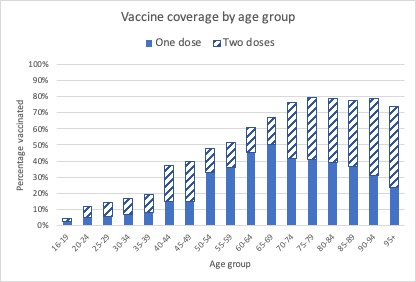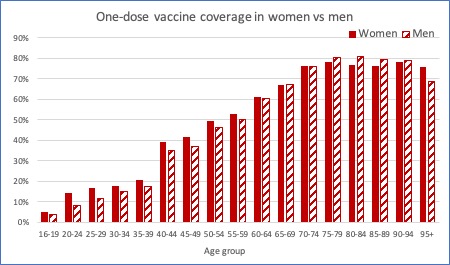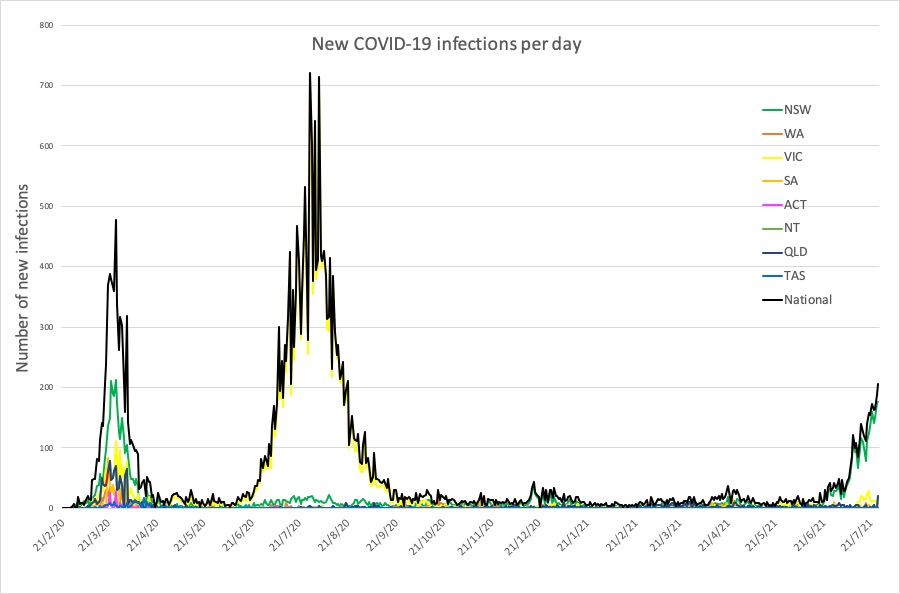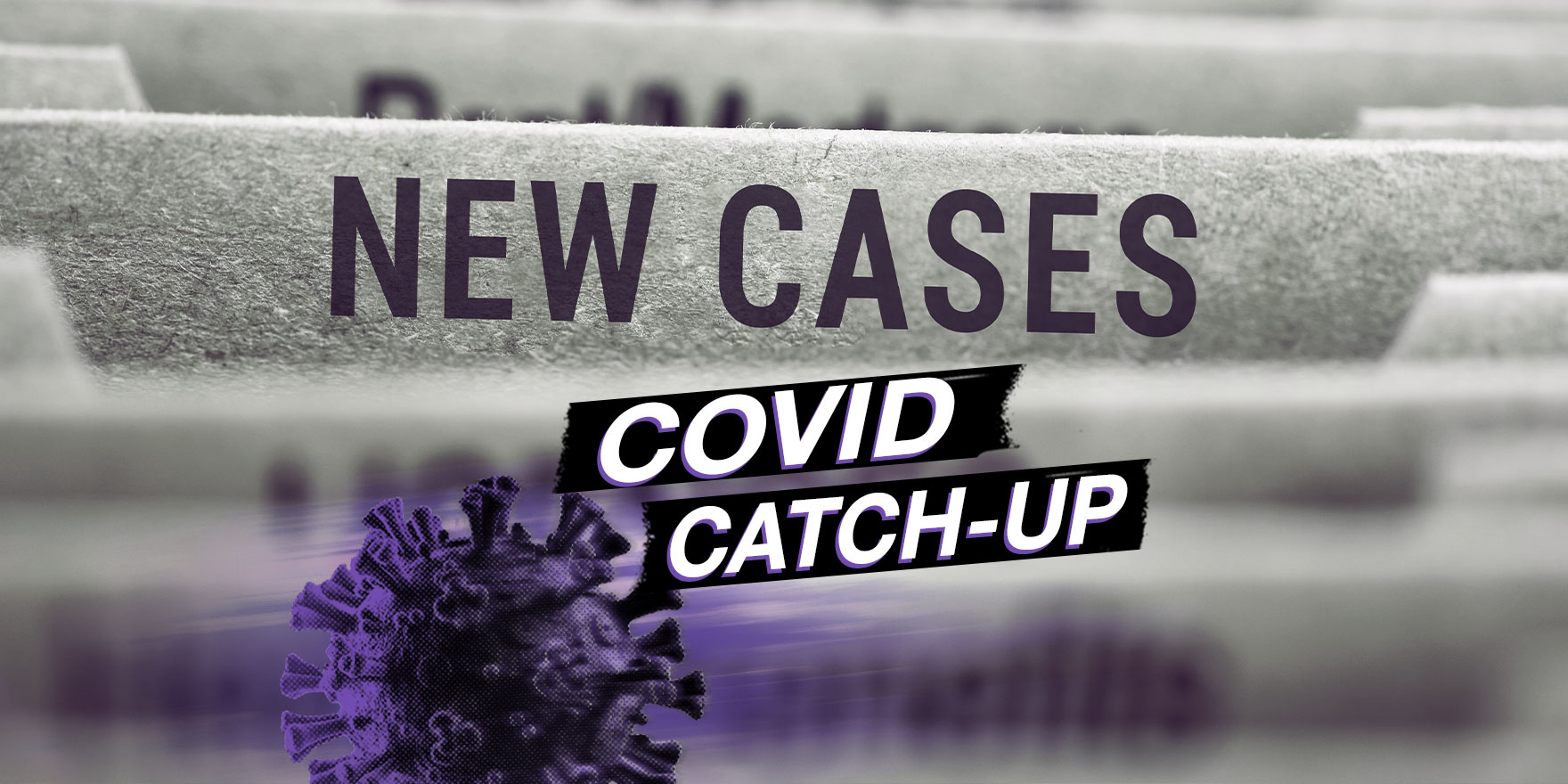And people with mental health disorders are at greater risk of dying from covid than those without.
Welcome to The Medical Republic’s COVID Catch-Up.
It’s the day’s covid-19 news in one convenient post. Email bianca@biancanogrady.com with any tips, comments or feedback.
29 July
- Vaccinated healthcare workers who experienced a breakthrough infection with Alpha variant had mild or no symptoms.
- Mental health disorders associated with increased risk of covid mortality.
- Cochrane review finds no reliable evidence of benefit from ivermectin in treating or preventing covid.
- US CDC recommends even fully vaccinated people mask-up.
- Where are things at with Australia’s vaccine rollout?
- Delta variant sends infection rates and deaths soaring globally.
- New restrictions for covid-affected areas of Sydney.
- Latest covid infection numbers from around Australia.
Testing of 1497 fully vaccinated healthcare workers in Israel identified 39 cases of breakthrough infection, none of which required hospitalisation.
A paper published in the New England Journal of Medicine reported the results of a prospective cohort study among 11,453 fully vaccinated health care workers – vaccinated with the Pfizer vaccine – around 13% of whom underwent RT-PCR testing either because of symptoms or known exposure to covid.
Two-third of those who tested positive had experienced only mild symptoms – most commonly upper respiratory congestion, muscle aches, loss of smell or taste, or fevers. The remaining one-third were asymptomatic, and six of these were considered borderline infections because their viral load was so low.
While none of those infected required hospitalisation, 31% reported symptoms lasting two weeks after their diagnosis, and 19% still had persistent symptoms at six weeks.
The good news was that none of the breakthrough infections spread: no secondary infections were detected either among colleagues or household members. All those who were tested had isolated for the required ten days after their positive result.
The majority of infections were attributable to the Alpha variant, which was the dominant strain in Israel at the time of the study.
People with mental health disorders are at increased risk of dying from covid, according to a paper published in JAMA Psychiatry.
A systematic review and meta-analysis looked at 16 studies involving 19,086 patients with mental health disorders and covid, and found a 38% higher mortality rate from covid among people with mental illness compared to those without mental illness.
In those with severe mental health disorders, such as schizophrenia and/or bipolar disorders, the risk of death from covid was 67% higher. These increased rates were independent of other risk factors such as comorbidities and age.
“This suggests that other factors lead to this health inequity in patients with mental health disorders, including several factors such as barriers to access to care, social determinants of health, immunological disturbances, and the effects of psychotropic drugs,” the authors wrote.
There is no reliable evidence to support the use of ivermectin to treat or prevent covid-19, according to a Cochrane review which also found that most studies of the antiparasitic agent were small and not of high quality.
The meta-analysis included 14 studies with 1678 participants, which looked at ivermectin compared to no treatment, placebo, or standard of care in preventing and treating covid. The authors noted that they excluded one of the main studies purporting to show a significant benefit from ivermectin, which was recently withdrawn over concerns about plagiarism and inconsistencies in the raw data.
The analysis found no clear evidence that the treatment reduced mortality in inpatients or outpatients with covid, or prevented infection.
“Overall, the reliable evidence available does not support the use ivermectin for treatment or prevention of COVID?19 outside of well?designed randomized trials,” they wrote.
The US Centers for Disease Control has advised fully vaccinated individuals should resume mask-wearing and social distancing indoors in areas with high rates of covid, as infection rates with the Delta variant increase across the US.
The CDC previously advised that fully vaccinated individuals could relax on mask-wearing and distancing if they were getting together with other fully vaccinated people.
However it has now changed that advice, based on data showing that even fully vaccinated people can still contract and spread the Delta variant.
What’s happening with Australia’s covid vaccine rollout?
Eleven million vaccine doses have now been administered since the start of the rollout – five million by GPs – and one million of those doses have been administered in the last week. In contrast, it took 47 days from the first dose to the millionth dose at the start of the campaign.
Just over 17% of Australians aged over 16 years are now fully vaccinated, and nearly 39% have had at least one dose of vaccine.

The vaccine coverage for NSW is pretty similar to coverage across Australia: just under 17% of those aged over 16 are fully vaccinated and nearly 38.4% have had at least one dose
At a national level, the most rapid uptake of first doses over the last month is in people in their forties, and the most rapid uptake of second doses is in those aged 70-90 years, who are all presumably now getting their second doses of AstraZeneca.
When it comes to gender, there’s not a clear trend in terms of vaccine uptake by women versus men. Generally, younger women have greater coverage of at least one dose than younger men, but older men have greater uptake than older women. Maybe the message about older men being at greater risk of severe disease and death has overcome men’s legendary unwillingness to see a doctor?

Delta continues to wreak havoc globally, with new infections up 8% in the last week compared to the previous week, and a 21% increase in deaths.
The latest WHO update is grim reading, especially after such a long trajectory of declines in infections and deaths, and WHO is predicting that we will reach 200 million total infections in a matter of weeks.
Basically, covid is on the rise pretty much everywhere except Africa and South-East Asia. Large parts of South and North America are in trouble – the US alone showed a 131% increase in new cases in the last week – Brazil had a 13% increase and rates are rising in Russia.
One bit of good news is a drop in new infections in Indonesia, while infection rates are holding steady in India.
Residents of the eight local government areas of NSW identified as major hotspots are now required to wear masks any time they leave the house, and cannot travel more than five kilometres from their home.
As NSW records the highest number of new infections yet – 239 – residents of Blacktown, Campbelltown, Canterbury-Bankstown, Cumberland, Fairfield, Georges River, Liverpool and Parramatta have been put under even greater restrictions in an attempt to control the spread of the Delta variant.
From midnight Thursday, all shopping, exercise and single-bubble excursions are limited to within 5 kms of home and only authorised workers may leave their local government area.
Queensland’s tally of new infections shot up by 20 yesterday, but 19 of those were among the crew of a ship moored off the coast.
Here are the latest covid-19 infection numbers from around Australia to 9pm Wednesday:
National – 33,473 with 921 deaths
ACT – 124 (0)
NSW – 8293 (176)
NT – 192 (0)
QLD – 1790 (20)
SA – 857 (0)
TAS – 234 (0)
VIC – 20,932 (8)
WA – 1051 (1)



